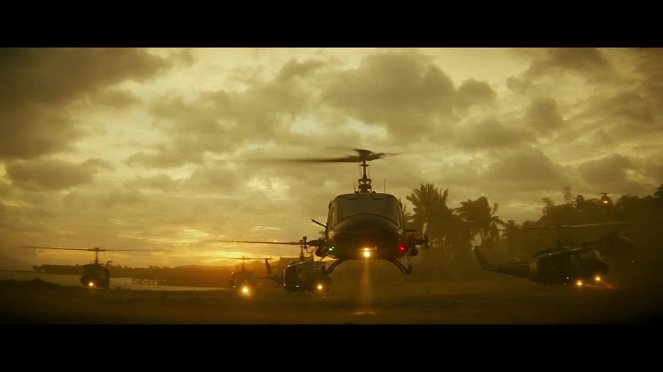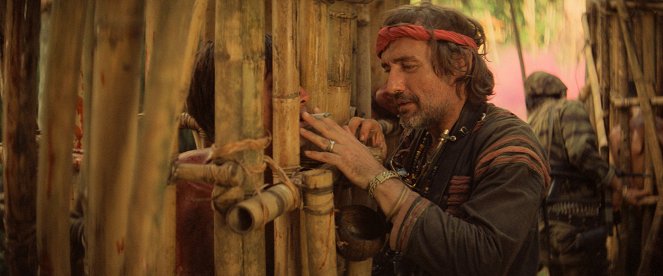Réalisation:
Francis Ford CoppolaPhotographie:
Vittorio StoraroActeurs·trices:
Martin Sheen, Marlon Brando, Robert Duvall, Frederic Forrest, Sam Bottoms, Laurence Fishburne, Albert Hall, Harrison Ford, Dennis Hopper (plus)Résumés(1)
Cloîtré dans une chambre d'hôtel de Saïgon, le jeune capitaine Willard, mal rasé et imbibé d'alcool, est sorti de sa prostration par une convocation de l'état-major américain. Le général Corman lui confie une mission qui doit rester secrète : éliminer le colonel Kurtz, un militaire aux méthodes quelque peu expéditives et qui sévit au-delà de la frontière cambodgienne. (Pathé Films)
(plus)Vidéo (2)
Critiques (11)
Apocalypse Now est un film existentiel très difficile qui vous charge l'estomac pendant quelques jours et vous oblige à réfléchir à ce que vous avez vu. Un voyage dépressif à travers un enfer brûlant. Il diffère des autres films de guerre en ce sens que le mal incarné par la guerre n'est pas visible ici, mais on le ressent. Et même s'il nous fait mal et nous pèse désagréablement, nous ne pouvons pas lui tourner le dos. Une œuvre hypnotique et époustouflante.
()
This isn't a film about war, it's a braving foray into the hell of the human soul into the backdrop of Vietnam. Like Conrad's Marlowe in Heart of Darkness, Coppola's Willard travels down the river in purgatory to find hell at the end of it. The apocalypse is conceived as a sequence of diverse stories that illuminate horror from different angles. Horror is the key word in the film. It doesn't matter if it's horror from the point of view of reed warblers or the French... it's the same horror Kurtz embodied in his apocalyptic and pagan-brutal encampment. It's the same horror that's been eating Willard since the beginning... Emptiness. The removal of humanity. Coppola's film is shot in an almost cynical tone. Absurdity often evokes Heller's Catch-22 with its power... Despite the runtime the gradation is amazing... I didn't find a weak spot. Every shot, every speech, every sound creates a riveting picture of horror on the bloody canvas of the Vietnamese jungle – suffering, loss of humanity, loss of self. I'm reluctant to write that Apocalypse Now is a metaphor. No, it's eerily literal and explicit. It is a direct image that impacts through all the means used. A masterful film in every way. In terms of suggestiveness, I don't know of any stronger war films. The actors have an incredibly naturalistic feel – crazy Brando, crazy Sheen... as if hell had consumed them. Apocalypse Now is masterful in the sense that while it says much about the nature of the Vietnam conflict, its impact is universal. It reveals something from the darkness of the human soul... And as for the oft-mentioned unfinished plot... can anything be said that still lasts? Coppola's Apocalypse Now doesn't end with headlines... in the film world, maybe.
()
Conrad's “Heart of Darkness” is one of those timeless books, and it's not bad at all. It is all the more remarkable that Coppola's adaptation does not fall short in any respect, it even surpasses it in many ways. At least in the director's cut, it is an equally riveting probe through the darkness of the soul and madness.
()
With his depiction of the war in Vietnam, Coppola managed to show all of the influences that slowly turned a regular man into a deranged madman. The dark aura built around Colonel Walter E. Kurtz is entrancing and Coppola’s style of gradually revealing his personality is just perfect. Also equally perfect is Marlon Brando himself who in his acting shaves the essence of man down to the marrow in his acting. Martin Sheen as Captain Willard superbly captured the transformation of a person scarred by war. His dilemma and inability to live as before. A breathtaking experience. A masterpiece.
()
I first saw Apocalypse Now practically at the same time as the similarly famous film Platoon. While Stone impressed me, I had a reserved attitude toward Coppola's war drama. I couldn't help but feel a certain disappointment, which partly came from exaggerated expectations - according to many movie fans, it should have been the greatest war film of all time. The execution is undoubtedly luxurious - Coppola showcases cunning filmmaking full of suggestive scenes, the camera works wonders, and the visual compositions send shivers down your spine. Everyone interested in film direction could learn from the effective use of double exposures and crossfades (the opening scene is characteristic, where the camera focuses on the detail of a helicopter propeller and then transitions to a hotel room, where we observe the spinning fan propeller). The gloomy jungle, the fascinating panoramic shots of tropical landscapes - it all creates what we call atmosphere. The quality actors portray intense characters exposed to extreme conditions. At this juncture, everything was fine and the reputation of Apocalypse Now was not a lie. However, I have a problem with the story. Coppola took it from Joseph Conrad's novel "Heart of Darkness." Its plot takes place in Belgian Congo and anyone familiar with the history of the Congolese genocide and bloody wars of the 20th century regarding the local natural riches will understand that the story of a deranged officer who escapes any control fits perfectly. The same narrative set in the Vietnam War, combined with an American officer, seems inappropriate and exaggerated. Not to mention that Coppola is so carried away by his artistic vision that it seems like he is not shooting a war drama, but rather staging a theater. This theatrical overexertion culminates in the execution of a rebellious officer, reminiscent of a pagan ritual, and it disturbs me to such an extent that the film didn't even come close to a five-star rating from my perspective. Overall impression: 75%.
()



Annonces